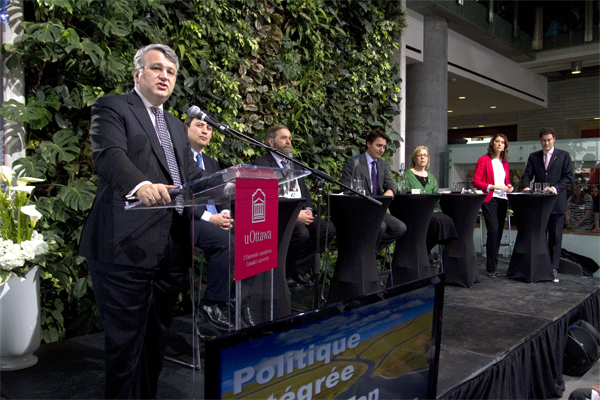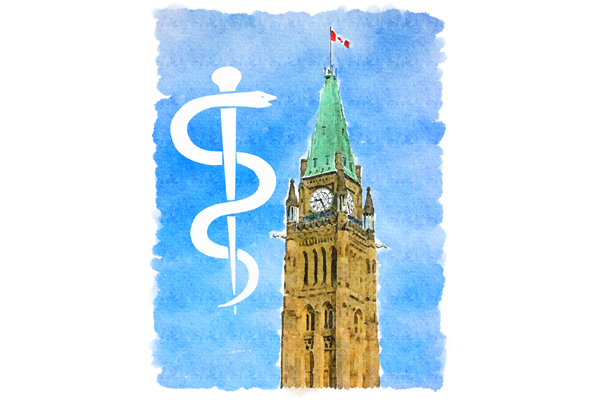Two different perspectives on what can be learned from political engagement event
Photo by Mico Mazza
I Vote event didn’t address underlying issues in youth voter turnout
Chelsea McManus | Staff Contributor
As proud as I am that Canadian political leaders came out to Ottawa’s I Vote event, I can’t help but think that it will be remembered as little more than a public relations event. At a time when the Fair Elections Act is under fire and youth voter turnout is at 38 per cent, coming out to speak with university students in such a controlled environment is a low-risk, high-reward decision for political leaders.
Usually, Canadian politics make me feel like a child sitting at the grown-ups table. Politicians talk about taxes, job creation and the deficit — all things I don’t really understand. I sit there and I nod; my opinion isn’t valued, nor is it asked for. But I don’t complain, because at the end of the day I get fed and at any point I can leave and watch TV. Having politicians come to my university and talk to students about youth voting is perhaps the first time that I have ever felt like an adult at the table, and I liked it.
However, I already vote, as do most of the people who showed up to the I Vote event. So in reality, the politicians came to preach to the choir. The real challenge in increasing youth voter turnout is to figure out how to engage youths who don’t show up to these events, and don’t give a shit about voting.
An Elections Canada National Youth Survey Report from the 2011 election found that 84 per cent of youths between the ages of 18 and 25 who had some university education voted, while 86 per cent of youth university graduates also voted.
But voter turnout for youths in college or trade school rests at 70 per cent, those with a high school diploma at 69 per cent, and only 42 per cent of youths who haven’t finished high school came out to vote.
At the event, Justin Trudeau said that in order to increase youth voter turnout, “We need to draw you in by reaching out and engaging with you.” OK that’s great, but how are you going to do that? Analysts state that low voter turnout implies the democratic system is not reflecting the interests of the population. So if less-educated people aren’t voting, how are you going to engage them? By talking at a university?
Pollster Nik Nanos and former parliamentary budget officer Kevin Page have been working on a project aimed at engaging youths in the political process, and have found that the concerns of young voters are more diverse than older Canadians. We are twice as likely to say that the environment and education are top national issues of concern.
But mentioning the environment in a press conference isn’t enough to get youths voting. Issues like the rise of restrictions with employment insurance, the increasing costs of public transit, and the incredible amount of student debt are issues that Canadian youths face today.
In Elections Canada’s report, they suggest that making voting easier for young people could help increase voter turnout, but as Nanos cleverly stated, “If we had the perfect voting system that was completely accessible, why do we think that more Canadians would vote if the content sucked?”
It’s not enough for politicians to sit and look pretty for photos while dishing out empty rhetoric to students who already vote. There needs to be a fundamental change in the way political debate is conducted in Canada. Politicians need to figure out how to engage youths who feel like the political system has forgotten them. That’s the only way you’re going to improve the stats and democracy.
Federal government’s ‘decision-based evidence making’ disturbing for Canadians
Jasmine van Schouwen | Staff Contributor
One question asked by a student during I Vote struck a chord with me: “What place do you think evidence has to have in policy making?”
But it was Michael Chong’s answer, representative of the Conservative Party, that left me shocked: “Often, evidence can point the government in one direction and other sets of evidence in the other direction. That’s why we have the House of Commons.”
Now, I’m a political science major, so I’m as big a fan as any of question period and live debates, but even I know that I’m not the right person to decide between two sets of scientific evidence, especially when the government has had a heavy hand in muzzling the scientists who produce the evidence.
According to Evidence for Democracy, an organization of scientists devoted to evidence-based policy making since 2007, the federal government has cut funding to scientific research that was likely to conflict with policy goals, and prevented scientists from approaching the media to speak about their research. A 2013 survey by the Professional Institute of the Public Service of Canada (PIPSC) found that 48 per cent of government scientists have seen information withheld causing the public to be misinformed, 86 per cent said they could not report actions that might harm the public without fear of censure, and 50 per cent said that public health or safety has been compromised by political interference in science.
As citizens of a country that can boast a plethora of scientific innovations — including insulin and heavy water reactor designs — cuts in funding to research centres, the shrinking of government departments that hire scientists and experts, and the closing down of research institutions by the federal government should worry us.
As Green Party leader put it, our government isn’t making evidence-based decision making — it’s making “decision-based evidence making.”
There is a fundamental problem with democracy when politicians can make decisions without consulting the experts who have spent their entire careers researching the issues, whether the issue is climate change, alternative energy solutions, medicine, or criminology.
Think about how you make decisions in your own life. It would seem ludicrous to base major everyday decisions on uneducated guesses. You wouldn’t select your car without looking up the specs, you wouldn’t choose a medical treatment without consulting a doctor, and most of us won’t even pick a movie without checking the experts’ reviews.
We realize that basing everyday decisions on trends or rumours can have serious consequences. This was evident only a few weeks ago when a measles outbreak was declared in Ontario, in great part because parents, influenced by scientifically unfounded anti-vaccination celebrity rhetoric, refused to vaccinate their children.
Shutting out the experts who reveal inconvenient truths may allow governments to make popular decisions in the short term, but it masks realities that have a significant impact on citizens’ lives. In the long term, “decision-based evidence making” can only stifle innovation, prevent scientific progress, and leave Canada lagging behind countries whose governments chose to promote research, even if it forces them to rethink their policies.
While our politicians may be very good at rallying supporters and defending their constituents’ interests, they can’t be expected to be experts in every field. There is a clear need to establish mechanisms that require leaders to base their decisions on the work of those who devote their lives to their fields of research, not on their personal ideology.





